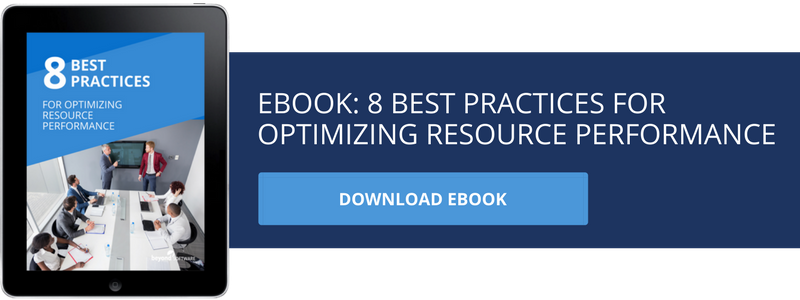Every company has had to deal with the consequences of a "bad hire" - a worker who, despite a promising resume and appropriate experience, ends up being a "bad fit" or even an outright disaster. When a worker must be let go, the company wastes all the resources already invested in their recruitment, training, and onboarding.
What those companies often don't track, however, are the external costs generated by that employee through inappropriate actions while on the job. Without adequate worker-related data, some companies can lose hundreds of thousands of dollars of real or potential revenues when their 'bad fit" fails to record their actual costs, and there's no independent method to go back and capture those details.
How Bad Workers Ruin Good Projects
Identifying a challenging employee is difficult; they are rarely overt in their bad behaviors, so leadership won't actually see them ridiculing their boss behind her back or charging a project for their time while they are actually running personal errands. Instead, supervisors often come to the realization rather slowly that one person may be the sole reason why certain project deliverables are always behind schedule. Research reveals that inappropriate employees manifest their errant behaviors in some fairly predictable ways:
Passive-aggressiveness
They may be saying, "yes, yes, yes," to their boss but their behaviors scream "no, no, no." Missed deadlines, coming in late, multiple excuses for failed efforts or misaligned team participation are often signs that the worker isn't as interested in doing the work as they are in getting paid for it.
Failure to track project requirements
Every project lives or dies based on getting the job done on budget and on schedule. Workers who don't accept project accounting parameters as their personal responsibility can run up and justify escalated costs which must subsequently be absorbed by their employer.
Poor communications
Maintaining a project calendar is a delicate balance of identifying what needs doing and who's available to do it. Employees who don't regularly report their activities, their absences, or their expenditures are either costing the company money or failing to generate for it its expected revenues. Companies that routinely do business in the field, which is the case for most project-based entities, risk high costs and reduced revenues when they don't plan adequately to capture every detail of their field-worker's day.
How Bad Workers Impact Teamwork
The bottom line isn't the only corporate asset to suffer from the antics of a bad worker:
The whole team suffers, too
When teamwork is responsible for project deliverables, every member of the team suffers when one of them isn't doing their job. Co-workers end up picking up the tasks in addition to their own; mistakes are hidden outside the purview of management, and even clients are misled about progress, all to save the face of both the errant worker and the company. The resulting resentment can poison the entire project effort and put off the client from hiring this firm again.
Management loses focus
A single weak employee can consume excess volumes of manager time and attention, drawing their focus away from project management duties. New hires are expected to need extra coaching and guidance, but professionals with long job histories or a glowing resume list of accomplishments shouldn't require the same level of oversight. The whole project suffers when one or two inefficient team members drain time and energy from the leader's day.
Loss of corporate reputation
Maintaining a high-quality reputation is becoming increasingly difficult as the global marketplace continues to add competition to every field. Every wrong step or missed deadline is enough to dissuade an existing client from becoming a long-term customer. Customers who see that an employee's work habits or ethics are below par often impart that reduced standard to the corporation as a whole. When given an alternative that promises high-quality work, they will almost certainly take it.
Project-dedicated Software Solves the Errant Employee Issue
Fortunately, today's project-based software is designed to give management the tools they need to track all elements of every project, and they are especially helpful when it comes to the employee and worker elements. Beyond Software is tailored to capture data across every project and include customizable dashboards so management can see what every worker is doing during every project day:
Time and Expenses Entries
Beyond's mobile app is accessed through each worker's mobile device and puts time and expense recording capacity in every worker's hand. While each worker can select the modes most convenient for them, every employee contributes to the project manager's dashboard for oversight and tracking. The app captures and stores images of expense receipts, which eliminates both wasted paper and the time lost searching for it. Time entries are parsed down to task levels, so every move is tracked and recorded for accurate billing.
Approvals
Single and dual-level approvals also occur through the app, whether they apply to individual expenses or whole project authorizations. Workers can get the go-ahead they need from wherever their approval person happens to be. The app handles and records reversals, as well.
Document Management
The app's simplicity makes it easy for even the most stubborn worker to record their activities, expenses, and incidentals down to a task level. Supervisors can readily see when delays occur, expenses are out of line with the budget, or project costs are escalating so they can investigate further and regain control of the issue.
There will always be bad employees, but because Beyond Software helps to identify them at the first sign of trouble, companies no longer have to suffer with them or pay for their excessive costs.
For additional information on Beyond Software please contact:
Nicole Holliday
nholliday@beyondsoftware.com
866-510-7839



